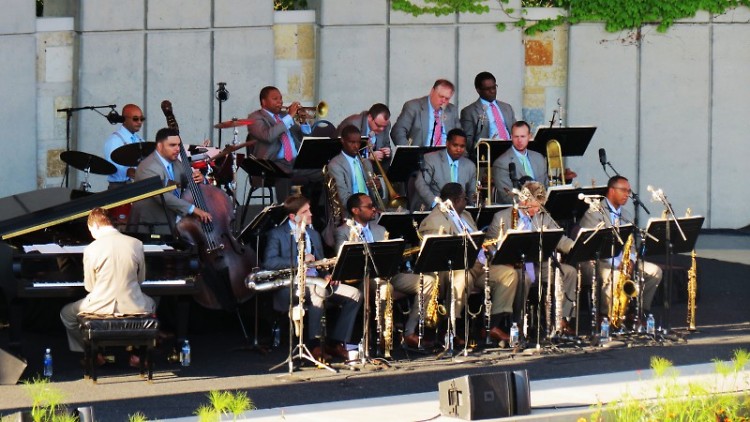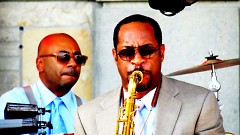Based on the soft-spoken opening words of Wynton Marsalis as he introduced himself and the Lincoln Center Jazz Orchestra, I was immediately struck with a feeling that this installment in the Frederick Meijer Gardens Summer Concert Series was going to be a relaxing evening in the hot sun.
“These are some of the greatest musicians in the world,” Marsalis announced, “I hope you find our music enjoyable.”
With polite applause welcoming the band to the stage, it appeared the crowd was prepared to keep it mild, with only a scarce few hoots and hollers emanating from the seated masses.
The Lincoln Center Jazz Orchestra consists of five saxophonists, three trombones, a drummer, a pianist, a double bassist and four trumpets including that of Marsalis. It quickly became clear that this night was not about Marsalis, however.
Despite Marsalis taking a few more solos than anyone else, most of the night featured expert playing from this world-class jazz orchestra.
Opening with couple of swinging licks from the Count Basie library, Marsalis and the orchestra proceeded to literally knock my socks off. My socks, of course, needed a little assistance from my hands in the knocking process.
Once thoroughly knocked, however, my feet were able to mingle with the grass and tap along freely with the rest of the performance.
A clear favorite among the crowd throughout the show was alto saxophonist Sherman Irby, who sat front and center among the saxophonists, sporting shades that brilliantly reflected the picturesque backdrop of Meijer Gardens. Irby also wielded a flute, clarinet and piccolo during the performance, much to the delight of the crowd.
The second set opened with a mysterious Irby composed gem, “Insatiable Hunger.” Based on the classic “Dante’s Inferno,” this piece opened with a slick, Pink Panther-esque saxophone over the crisp, quiet cymbal-laden drumming of Detroit native Ali Williams.
Irby’s composition unfolded like a great mystery in and of itself, with muted trombones wailing over fresh woodwinds and some seriously solid tambourine playing by Williams.
The show continued with two by Thelonious Monk and a delightful Irby version of “Baa Baa Black Sheep,” which featured the brass players imitating sheep with their instruments.
Closing out the set was the Duke Ellington masterpiece, “Braggin’ in Brass.” Marsalis explained that this composition was nearly impossible to play, with an incredibly intricate and breakneck trombone section that Ellington himself was afraid to play live.
Nonetheless, the Lincoln Center Jazz Orchestra Trombonists nailed it, playing in an alternating sequence so feverish you could hardly tell who was playing what.
Throughout the night, the graciousness of the crowd was underwhelming. The only dancing to be seen was the occasional toe-tapping or finger-wagging.
I assume that the fine folks attending the concert know more about jazz etiquette than I do, but I’m used to a festival atmosphere with hippies running around naked, dancing as freely as the wind blows.
While this concert was definitely unfitting for a scene like that, I would have imagined more movement from the audience. I had a very tough time sitting as still as most during this world-class performance.
There is something to be said, though, for the level of respect demonstrated by the crowd towards these musicians. What exactly should be said, I’m not sure, considering this was the kind of respect that garnered intense silence during the performance.
The silence was so profound at times, nearby birds could be heard whistling to each other about the intricate improvisations of the Lincoln Center Jazz Orchestra.
When Marsalis said that these were some of the best musicians in the world, he wasn’t lying. His words also rang true as he described their philosophy of not segregating jazz because of era or anything else.
“If it was good, it is good,” says Marsalis.
Lucky for patrons of Meijer Gardens this evening, what he and the Lincoln Center Jazz Orchestra showcased will definitely be good for a long, long time.
The Rapidian, a program of the 501(c)3 nonprofit Community Media Center, relies on the community’s support to help cover the cost of training reporters and publishing content.
We need your help.
If each of our readers and content creators who values this community platform help support its creation and maintenance, The Rapidian can continue to educate and facilitate a conversation around issues for years to come.
Please support The Rapidian and make a contribution today.


